
A recent report from the Pew Research Center, “The Future of Truth and Misinformation Online,” showed experts “evenly split on whether the coming decade will see a reduction in false and misleading narratives online.” While 51 percent of these experts do not expect the information environment to improve, 49 percent were more hopeful. Members of this latter group acknowledged that “misinformation and bad actors have always existed but have eventually been marginalized by smart people and processes,” and they “believe better information literacy among citizens will enable people to judge the veracity of material content and eventually raise the tone of discourse.”
Librarians have taught information literacy and related content at SPU for decades and currently teach over 200 class sessions each year. Last year, as part of the University’s new writing program, librarians began teaching embedded research sessions within disciplinary writing seminars. In addition to linking writing and research literacies, the Library has been evolving its instruction program and services to include digital literacies. New competencies in information technology literacy, digital participation, and digital scholarship now supplement information literacy. And each competency includes attention to the cultivation of reflective and ethical dispositions. Evaluations of instruction sessions, writing courses, and library programs reveal the relevance of teaching information and digital literacies for student success and, we believe, holistic flourishing beyond college.

